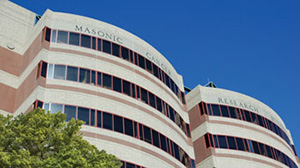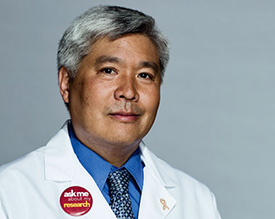Nov. 1, 2014:
A conversation with Douglas Yee, MD, director of the Masonic Cancer Center, which is a member of the Big Ten Cancer Research Consortium.
Q: What strengths does the Masonic Cancer Center bring to the consortium?
At the University of Minnesota and at the Masonic Cancer Center, there is a very collaborative atmosphere. We act collectively with the goal to change cancer outcomes, versus looking to finish a task solely on our own. The leadership here will bend over backwards to help each other because that ultimately helps patients.
For example, I work mainly on breast cancer, and a colleague of mine focuses on HIV. He has studied mechanisms of resistance to HIV therapy and noticed that mechanisms involved in HIV drug resistance might also be implicated in the breast cancer mutational process. After confirming the similarities, and specifically a role for APOBEC3B, we received additional funding for further work on the role for this protein in the development of endocrine resistant breast cancer. Collaborating with colleagues in medicinal chemistry, we are developing small molecule inhibitors of APOBEC3B. If we can develop a drug to target this enzyme, then the consortium would be an ideal place to conduct the clinical trial validation. Everyone on this campus, no matter the center or school, thinks about how they can contribute to curing cancer.
Continuing with our collaborations, we have excellent translational care. We are strong partners with our hospital system, UMN health, and the Masonic Children’s Hospital. Our pediatric and adult oncologists work very closely together especially in the area of bone marrow transplantation and cellular therapies. This group has made important laboratory findings and then brought them directly to the clinic. A great observation in the lab, is essential to inform clinical care, but the advances don’t affect anyone until you know they work in a clinical setting. We focus on this teamwork to ensure our research can directly help patients.
Q: What kind of scientific developments happening at Masonic Cancer Center are changing the way we diagnose and treat cancer?
 The Masonic Cancer Center is working diligently on cellular therapies. Our bone marrow transplantation program is focused on learning how allogeneic donor cells kill tumor and discovering ways to enhance cell mediated cytotoxicity. These therapies are typically used for leukemia and lymphoma and are supported by two P01 grants which incorporate new clinical trials. We understand that bone marrow transplants are a viable cellular immunotherapy and need to translate these advances into other cancers as well, such as melanoma and ovarian cancer, and ultimately share our research and treatment possibilities with the consortium.
The Masonic Cancer Center is working diligently on cellular therapies. Our bone marrow transplantation program is focused on learning how allogeneic donor cells kill tumor and discovering ways to enhance cell mediated cytotoxicity. These therapies are typically used for leukemia and lymphoma and are supported by two P01 grants which incorporate new clinical trials. We understand that bone marrow transplants are a viable cellular immunotherapy and need to translate these advances into other cancers as well, such as melanoma and ovarian cancer, and ultimately share our research and treatment possibilities with the consortium.
Q: How will the Masonic Cancer Center help to advance cancer research and care?
This ties back in with our ability to collaborate. The University of Minnesota is the primary state-supported research institution in the state. Our cancer center allows us to serve as a focal point for all the other research units on campus. As a matrix center, our members come from all parts of the university; this allows many different units to study cancer, not just the Medical School. For example, our School of Veterinary Medicine, frequently sees osteosarcoma in dogs and a major research collaboration, supported in part by the Masonic Cancer Center, involves veterinary, pediatric, and adult oncologists and surgeons to approach this disease. Abnormalities in genetic pathways seen in canine osteosarcoma are shared with humans, allowing us to collaborate and treat both dogs, children and adults alike.
By having a broad and diverse faculty, we can look at cancer as a whole, not just solely from a biologic or medical standpoint. Cancer etiology and interventions via health policy or prevention strategies are important components of our research portfolio. Our tobacco control research combines biomarker, behavioral, ad medical methods to help patients stop smoking. We also have a collaboration with the Hormel Institute, which focuses on foods and natural products and their role in cancer prevention and treatment. We take a broad view of the cancer problem and want to make advances across many disciplines through collaboration. By using the many areas of expertise on campus, the Masonic Cancer Center can study many aspects of cancer, and create viable prevention, treatment, and survivorship options.
About the Big Ten Cancer Research Consortium: The Big Ten Cancer Research Consortium creates a unique team-research culture to drive science rapidly from ideas to treatment-changing paradigms. Within this innovative environment, today’s research leaders collaborate with and mentor the research leaders of tomorrow with the unified goal of improving the lives of all patients with cancer.
About the Big Ten Conference: The Big Ten Conference is an association of world-class universities whose member institutions share a common mission of research, graduate, professional, and undergraduate teaching and public service. Founded in 1896, the Big Ten has sustained a comprehensive set of shared practices and policies that enforce the priority of academics in student-athletes’ lives and emphasize the values of integrity, fairness, and competitiveness. The broad-based athletic programs of the 14 Big Ten institutions provide nearly $200 million in direct financial aid to almost 9,500 student-athletes for more than 11,000 participation opportunities on 350 teams in 42 different sports. The Big Ten sponsors 28 official conference sports, 14 for men and 14 for women, including the addition of men’s and women’s lacrosse as official sports for the 2014-15 academic year. For more information, visit www.bigten.org.















Subscribe to the Big Ten CRC Newsletter X
X Facebook
Facebook YouTube
YouTube